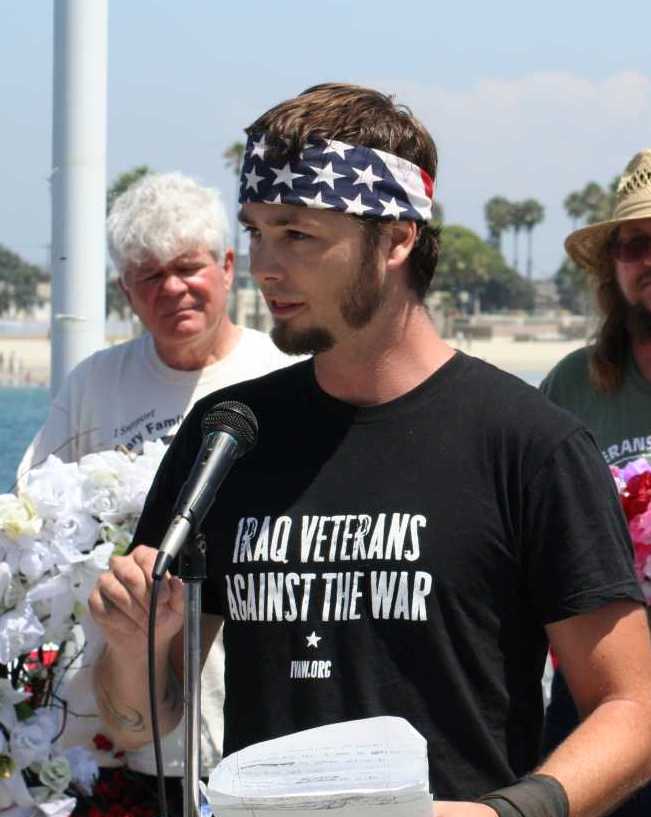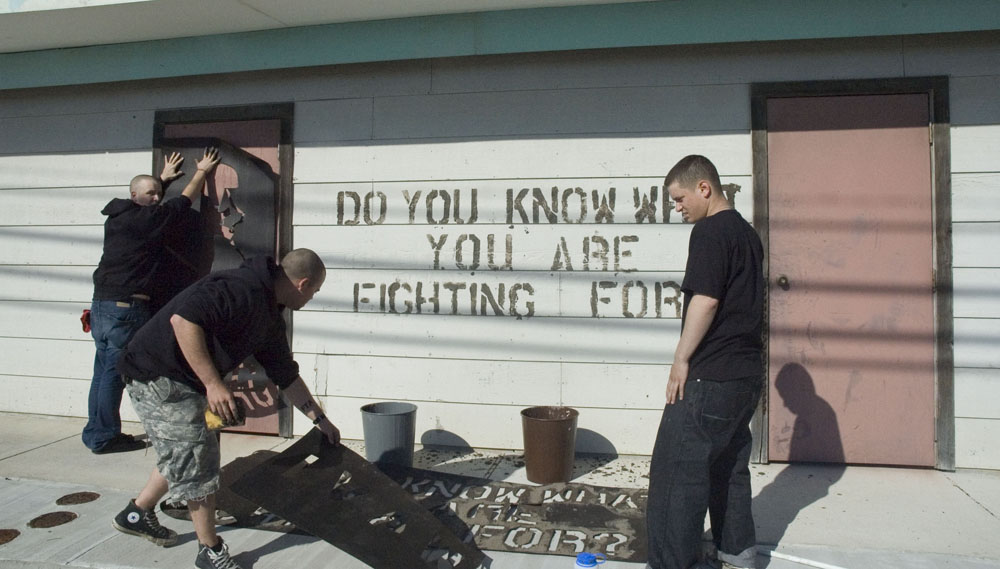 Download PDF of this full issue: v39n2.pdf (11.6 MB)
Download PDF of this full issue: v39n2.pdf (11.6 MB)From Vietnam Veterans Against the War, http://www.vvaw.org/veteran/article/?id=1295
 Download PDF of this full issue: v39n2.pdf (11.6 MB) Download PDF of this full issue: v39n2.pdf (11.6 MB) |
Under the terms of the Status of Forces Agreement, the US government is legally bound to withdraw its troops from Iraq by the end of 2011. Barring war with Iran or a sudden flare-up of violence in Iraq, troop withdrawals should proceed roughly within the time line outlined in the SOFA. This presents a raison d'etre question for Iraq Veterans Against the War, founded in opposition to the US military occupation of Iraq.

|
|
Ryan Endicott, IVAW member and former Marine, at the Memorial at Sea in Seal Beach, California, August 2009 |
This question has created ambiguity and anxiety within the Veteran wing of the movement accustomed to identifying and drawing moral authority and credibility primarily from firsthand experience in combat or combat support roles. As the military aspect of the conflict takes on an increasingly less prominent role, our authority in the public eye is reduced in significance. While deeply frustrating to many, this also opens an opportunity for internal education and a broadening of perspective essential to continue our fight.
Although political and economic matters generally receive more quiet attention outside of business newspapers and are not widely paid attention to within our movement, an awareness and understanding of these issues is critical. The question of who has control over what resources is almost invariably the root cause of all conflict. The history of US-Iraq relations demonstrates this very well. Since the late 1950s when the US established ties with Saddam Hussein against an anti-imperialist Iraqi government, oil has never ceased to be a primary concern for successive administrations, though US access to it has been limited for several decades up until the 2003 invasion. Since 2003 it has been an issue of primary concern for the Bush and now the Obama administration.
What is happening today is essentially a repeat of history in many respects. Just as the British in the post-WWI era occupied Iraq and eventually established control over Iraq's newly discovered oil fields, our military has been used to pave the way for US oil companies to reestablish their dominant position in Iraq. Overt collaboration would have been out of the question given the political and military consequences, but behind-the-scenes diplomatic efforts to accomplish this objective have been ongoing since at least 2002.
This would lead to deep resentment and long term political instability in Iraq, perpetuating the cycle of socioeconomic retardation imposed by Western powers through repeated interference throughout the wider region. It would also serve as a convenient, effectively engineered pretext for pressuring the Iraqi government to extend the terms of the SOFA to allow for an indefinite US military presence, significantly reduced in size but nonetheless capable of maintaining a US allied government in power. President Obama has not demonstrated himself to be willing to engage in such cynical statecraft but his predecessor's vice president and other members of the administration certainly were; and they enjoyed the virtually unquestioning loyalty of most of their party members in Congress.
Where do these events place the Veteran wing of the anti-imperialist movement? They place us in the unique and very challenging position of having to become experts of US foreign policy on the fly. It goes without saying that this is not our natural strength, which is for most of us 'on the ground' at the tactical and operational levels. But this is the direction in which we must evolve if we are to complete the spirit of our mission, which is the restoration of full sovereignty to Iraq. This does not mean simply a withdrawal of troops but also economic self-determination, which requires Iraqi control over Iraqi resources. This is what the leaders of US oil companies and their allies in government wish to deny the Iraqi people. They are our enemy. It is time for us to learn how to fight them.
The Iraqi oil unions have successfully resisted foreign control over their industry since the 2003 invasion, when they forced Halliburton to withdraw from their oil fields. Since then they have toured the US twice, meeting with American labor leaders, anti-imperialist activists and members of Congress. In March 2008, IVAW member Aaron Hughes and myself traveled to Erbil, Iraq to meet with the leaders of this political resistance movement. It is critical that we develop this cross-border relationship and provide them with tangible assistance, financial and political, if we are to succeed against our common adversary.
The reaction of those who are not accustomed to organizing across borders in opposition to the political/business elites of their own country is to label those who do as 'communists' or 'socialists' but in reality three things are clear: (1) 'globalization' is nothing more than the organizing efforts of these elites in pursuit of their interests across borders; (2) they are not concerned with the culture, customs, language or religion of their counterparts in other nations so long as their collaboration results in opening new markets for investment; (3) in the case of militarist policies used to force open markets and exploit labor, their interests are not ours; (4) if we do not organize across borders, i.e. globalize our resistance, we will lose what is in fact our common and inextricably linked struggle.
Since the 1970s, multinational corporations have been able to invest capital more profitably in cheaper labor throughout the developing world, thus neutralizing the power of organized labor. These defeats will continue so long as the labor movement does not follow suit and globalize. Iraq presents a tremendous opportunity because it has become a lightning rod of grassroots political opposition throughout American society, including among the labor unions of the AFL-CIO, the largest labor organization in the US.
Our next most likely ally is the renewable energy movement, which is becoming an increasingly formidable political force in the US. This movement is naturally hostile to the continued market dominance of the fossil fuel industry because this dominance allows it to wield its tremendous collective financial resources on the political field of battle in order to perpetuate its power and stifle government support for alternative energy sources.
It is clear that US dependence on foreign oil, perpetuated by the influence of US oil companies, is a threat to our collective security for several reasons. One is the potential economic consequence. No less significant is the temptation it has created, and to which successive administrations have succumbed, to interfere in the internal politics of foreign nations, leading to the rise of militant nationalism and terrorism. The global conflict we find ourselves in today did not begin on September 11, 2001 or at the end of the Soviet-Afghan war but decades ago. In fact it can be traced back at least into the 1950s. This is the narrative we as Veterans need to communicate on a national level if we are to fulfill our moral obligation to the Iraqi people and to save our nation from the disastrous course successive administrations have led us down in pursuit of wealth built on the precarious foundations of Empire.
T.J. Buonomo is a former Military Intelligence Officer and member of the Board of Directors of Iraq Veterans Against the War.
His views are his own and not necessarily representative of IVAW.

|
| IVAW on Fort Hood Outreach Mission |